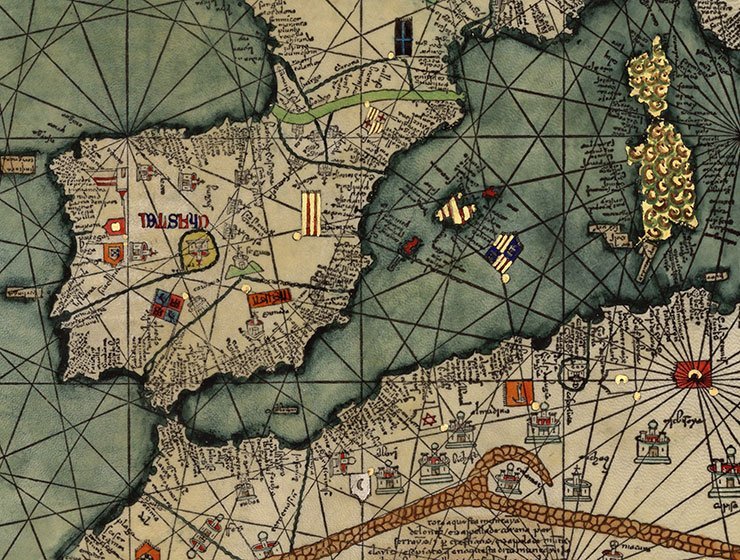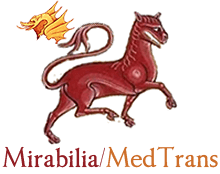
-Index-
Special Issue
Presentation
Antonio CORTIJO, Vicent MARTINES
Original title: Presentació
Ramon Llull and the Muslims: a difficult propose for conversion
Gabriel ENSENYAT PUJOL
Original title: La difícil proposta lul·liana per a la conversió dels musulmans
Keywords: Dialogue, Force, Muslims, Ramon Llull, conversion.
Although Ramon Llull has a knowledge of Islam, different factors impossibilities the success of the mission. Some factors were interiors of Christianity and another were different causes: the difficulty of the subject he chose, the psychological restraints, the opposition of Islamic public power, the scarce predisposition to dialogue of Muslim people and, finally, the impossibility to impose a religion without using force.
Regarding about Dietari from Català de Valeriola (1568-1608)
Carles FENOLLOSA LAGUARDA
Original title: A propòsit del Dietari de Català de Valeriola (1568-1608)
Keywords: Catalan Literature, Català de Valeriola, Diaries, Memorialistic, Sixteenth century, Valencia.
This paper provides a general overview of one of the figures of sixteenth century Valencian literature, Bernat Català de Valeriola, and his lesser well-known diary, one of the best examples of the Valencian memorialistic works of that period.
Conjunctions and prepositions in the 16th century. Uses in a Mallorcan math book
Joan-Antoni MESQUIDA CANTALLOPS
Original title: Conjuncions i preposicions al segle XVI. Usos en un tractat d'aritmètica mallorquí
Keywords: 16th century, Arithmetic, Catalan language, Conjunctions, Prepositions.
In this article, we study the conjunctions and prepositions that appear in Joan Ventallol’s Pràtica mercantívol, which was published in Lyon in 1521. This text, which was initially released in Catalan and later translated into Spanish in Tarragona (1619), enables us to study the language that was used for non-aesthetic purposes within the field of applied mathematics. Alongside our classification of the conjunctions and study of their main uses, we analyse the unstressed prepositions of the Catalan language a/en, de/amb, per/per a and we catalogue the stressed prepositions that we have observed in the above-mentioned publication. These connections contribute to our general knowledge of the use of the Catalan language for non-literary purposes during the 16th.
Three carmesinas real and one fictional. The interest in the dialogue between History and Literature for the interpretation of Tirant lo Blanc
Abel SOLER
Original title: Tres Carmesines reals i una de ficció. Interés del diàleg entre Història i Literatura per a la interpretació de Tirant lo Blanc
Keywords: Carmesina, Chivalric novel, Jaume de Vilaragut, Joanot Martorell, Tirant lo Blanc.
This article focuses on the historical Valencian knight and baron Jaume de Vilaragut (+ca. 1464), a friend from chilhood of Joanot Martorell, a devout reader of chivalric and Arthurian literature as well as of romances of materia Trojana. He married a member of the Martorell family, became a corsary and defender of Rhodes, was a prisoner of the Great Caramany and of the sultan of Babylon. He also resided at Naples together with the author of Tirant lo Blanc (1460-1464), and was a frustrated commander of the Crusade to recuperate Constantinople following the plan of Pope Calixtus III (1455). He could have been the inspiration for Tirant himself. This hypothesis is reinforces by the fact that there are three Carmesines from the mid-15th century associated with him: A Carmesina his "servant" and possibly his lover; Carmesina Requesens, his niece, born in the 1450s; and Carmesina de Corella, of whom he was godfather ca. 1452. The first Carmesina could have been the inspiration for the princess Carmesina of the chivalric novel.
Two poetic loose sheets of War of the Reapers (1640-1652/59)
Àngels SENDRA MORANT
Original title: Dos plecs solts poètics de la Guerra dels Segadors (1640-1652/59)
Keywords: Baroque, Catalan Literature, Critical edition, Modern Age, Political literature.
This project has as an objective the critical editing of two letters written anonymously in thematically related heptasyllabic verses, with little time difference. These two letters, Carta que ha enviada la vila de Perpinyà a Cathalunya, ahont va contant totas sas desdichas and Resposta que fa Cataluña a una carta que li ha enviada la vila de Perpiñà, ab la qual plora las desdichas pateix en recompensa de innumerables servicis, which are propagandistic poetic broadsheets dated 1641, were intended to transmit political ideas related to the Catalan Revolt (1640-1652/59). In this regard, the project attempts to contribute to the recovery of political literature from this period by editing texts that until now could only be found in two documents from the XVII century, contextualizing them in this warlike incident.
When the monster is called Bluebeard
Maria de la Pau JANER
Original title: Quan el monstre es diu Barbablava
Keywords: Bluebeard, Chamber prohibited, False travel, Perrault, Tales husband killer, The husband monstrous, Transgression.
This paper provides a general overview of one of the figures of sixteenth century Valencian literature, Bernat Català de Valeriola, and his lesser well-known diary, one of the best examples of the Valencian memorialistic works of that period
The Nature Diccionary from Enric Valor’s work
Joan de Déu MARTINES LLINARES
Original title: El Diccionari de la Natura de l’obra d’Enric Valor
Keywords: Dictionaries, Enric Valor’s léxicon, Lexicography, Linguistic of the corpus.
The purpose of this article is to explain the importance to do a dictionary of the nature of Enric Valor’s work as a first step to make a future dictionary of all his lexicon. We have explained the two main aims. The first is to do more accessible and known the work to the contemporary and future readers, particularly for the education of the language and the literature. And the second, pursue with the recovery and diffusion of the lexical heritage of the Catalan of the Valencians initiated by the same teacher of Castalla. It has chosen the lexicon of the nature because it is the vertebral column of the model of language of the writer of Castalla since Enric wanted to recover and rescue of the oblit the mots genuine of the Valencians and these are the ones of the rural field, the ones of the land and elevated them to literary category. In addition, we have offered a small sample of how will be this dictionary with the criteria of preparation, that, in the big majority will follow and will adapt, the ones of the DDLC. And an appendix with some examples to illustrate them.
The translation of the classics of the Crown of Aragon into the Asturian language
Pablo SUÁREZ GARCÍA
Original title: La torna de los clásicos de la Corona d’Aragón a la llingua asturiana
Keywords: Asturian language, Catalan language, Crown of Aragon, Valencian language, translation.
This paper presents the current state of the translations of the classics of the Crown of Aragon that the author was making into the Asturian language.






















































































